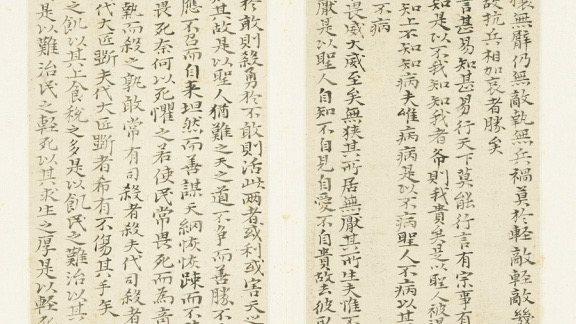Tao Te Ching is a classic Chinese text that presents the philosophy of Taoism, which emphasizes living in harmony with the natural world. The book is composed of 81 short chapters that contain poetic and metaphorical verses, providing guidance on how to live a simple and fulfilling life.
The central concept – of Taoism is the Tao, which is often translated as “the way.” The Tao is the natural order of the universe and cannot be described or fully understood through language or concepts. The Tao is said to be both the source and the destination of all things and is characterized by qualities such as spontaneity, simplicity, and humility.
The book also discusses the concept of the Te, which is often translated as “virtue” or “power.” The Te is the ability to act in accordance with the Tao, and it is achieved through cultivating qualities such as compassion, patience, and wisdom.
The Tao Te Ching emphasizes the importance of living in harmony with nature and avoiding excessive ambition or desire. The book encourages a simple and humble lifestyle and discourages attachment to material possessions or worldly success.
The Tao Te Ching provides guidance on how to live a good life by emphasizing the importance of harmony, simplicity, and humility. It encourages individuals to live in accordance with the natural order of the universe, or the Tao, and to cultivate qualities such as compassion, patience, and wisdom. Here are some key teachings from the book:
- Live in harmony with the Tao: The Tao is the natural order of the universe, and living in harmony with it leads to a good life. This means avoiding excessive ambition or desire and embracing a simple and humble lifestyle.
- Cultivate virtues: The Te, or virtue, is the ability to act in accordance with the Tao. This is achieved through cultivating virtues such as compassion, patience, and wisdom.
- Live simply: The Tao Te Ching teaches that we should live simply and focus on the present moment. We should not worry about the past or the future, and we should not be attached to material possessions or worldly success.
- Embrace simplicity: The Tao Te Ching encourages individuals to live a simple and humble life, avoiding attachment to material possessions or worldly success.
- Practice non-action: The book teaches the concept of Wu Wei, or non-action, which means acting without effort or force. This involves letting go of the desire to control or manipulate the world around us and allowing things to unfold naturally. We should not try to control things that we cannot control.
- Embrace change: The Tao Te Ching teaches that change is a natural part of life and that it is important to embrace it rather than resist it. This means letting go of attachment to the past or the future and focusing on the present moment
Quotes from the Tao Te Ching that relate to human nature and how to live a good life:
- “The Tao that can be spoken is not the eternal Tao. The name that can be named is not the eternal name.” – Chapter 1
This quote emphasizes the idea that the Tao, or the underlying natural order of the universe, cannot be fully understood or expressed through language or naming.
- “Knowing others is intelligence; knowing yourself is true wisdom. Mastering others is strength; mastering yourself is true power.” – Chapter 33
This quote suggests that true power and wisdom come from understanding and mastering oneself, rather than trying to control or dominate others.
- “Nature does not hurry, yet everything is accomplished.” – Chapter 45
This quote highlights the idea that the natural world operates in a calm and unhurried way, yet still manages to achieve everything it needs to.
- “The Master sees things as they are, without trying to control them. She lets them go their own way, and resides at the center of the circle.” – Chapter 29
This quote emphasizes the importance of non-interference and allowing things to happen naturally, rather than trying to control or force them.
- “Simplicity, patience, compassion. These three are your greatest treasures. Simple in actions and thoughts, you return to the source of being. Patient with both friends and enemies, you accord with the way things are. Compassionate toward yourself, you reconcile all beings in the world.” – Chapter 67
This quote suggests that simplicity, patience, and compassion are important virtues for living a good life and achieving inner peace and harmony.
